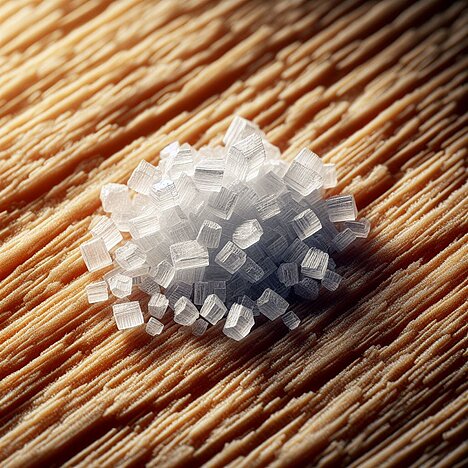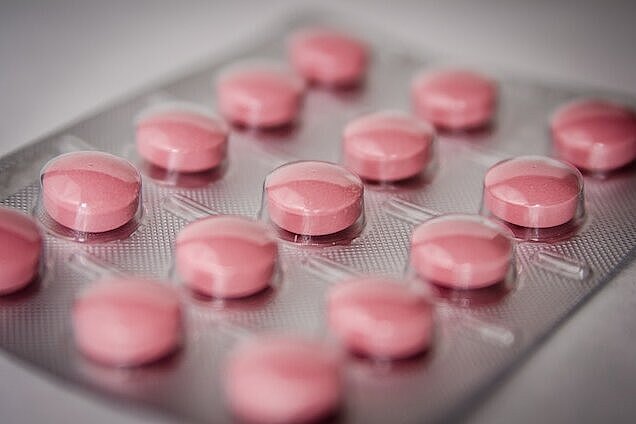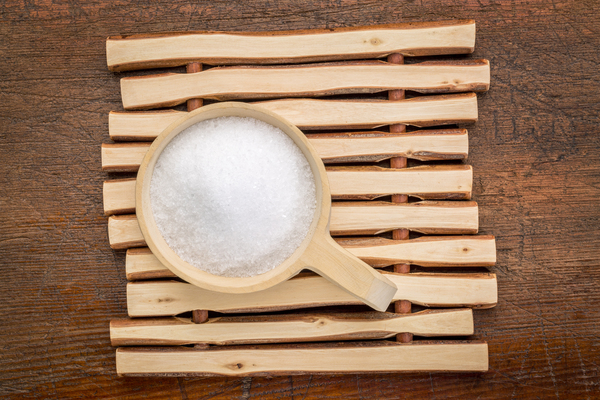Selenium

What is selenium?
Selenium is a chemical element that occurs in nature in various forms. There are organic and inorganic selenium compounds, which differ in their bioavailability and effect. Organic selenium compounds are those that are bound to amino acids, such as selenomethionine or selenocysteine. These are better absorbed and utilized by the body than inorganic selenium compounds, which are present as selenite or selenate. Inorganic selenium is chemically more stable and therefore suitable for the manufacture of food supplements, but can lead to symptoms of intoxication at high doses.
Selenium is mainly found in food in animal products such as fish, meat, eggs and dairy products. Some plant foods such as nuts, pulses and cereals also contain selenium, albeit in smaller quantities and depending on the selenium content of the soil in which they are grown. Dietary selenium intake therefore varies according to region and diet.
Why is selenium important for dogs?
Selenium is an essential nutrient for dogs, which means that it must be supplied with food as it cannot be produced by the body itself. Selenium is an important component of more than 20 different enzymes and proteins in your dog's body that fulfill various functions.
The most important tasks of selenium are
- The formation of glutathione peroxidase, an enzyme that neutralizes free radicals and thus protects the cells from oxidative stress. Oxidative stress can lead to inflammation, ageing and diseases such as cancer or arthritis.
- The regulation of thyroid hormones, which influence your dog's metabolism, growth and development. Selenium is involved in the conversion of thyroxine (T4) into triiodothyronine (T3), the active thyroid hormone.
- Promoting fertility and sperm quality in males and ovarian health in females.
- Supporting the immune system and defense against infections and pathogens.
How much selenium does your dog need?
The optimal dosage of selenium for dogs is controversial, as there are no clear studies on this. According to the National Research Council (NRC), the recommended daily dose of selenium for dogs is 0.5 µg per kilogram of body weight.
According to the NRC, the maximum tolerable dose of selenium for dogs is 0.9 µg per kilogram of body weight.
However, these values are only guidelines and may vary depending on individual factors such as your dog's age, health, activity and diet. It should also be noted that the bioavailability and toxicity of selenium depends on the form in which it is supplied. Organic selenium is better tolerated and safer than inorganic selenium.
How can you supply your dog with selenium?
The best way to provide your dog with selenium is through a balanced and species-appropriate diet that includes both animal and plant sources of selenium. The best natural sources of selenium for dogs include:
- Fish, especially sea fish such as salmon, mackerel, herring or sardines
- Meat, especially offal such as liver, kidney or heart
- Eggs, especially the yolk
- Dairy products such as cheese or yogurt
- Nuts, especially Brazil nuts or walnuts
- Legumes such as lentils or peas
- Grains such as oats or rice
If you feed your dog ready-made food, you should make sure that it has a sufficient and high-quality selenium content. Most commercial dog foods contain selenium in the form of sodium selenite or sodium selenate, which are inorganic selenium compounds. While these are cheaper and more stable than organic selenium compounds, they are also less bioavailable and potentially more toxic. If you feed your dog a ready-made food with inorganic selenium, you should pay close attention to the dosage and not exceed it.
If you feed your dog home-prepared food, you should make sure that it contains a balanced mix of different selenium sources. You can also use a high-quality dietary supplement with organic selenium to optimize your dog's supply. There are various products on the market that contain organic selenium compounds such as selenomethionine or selenium yeast. These are more bioavailable and safer than inorganic selenium. If you give your dog a dietary supplement with organic selenium, you should pay close attention to the dosage and not exceed it.
What are the benefits and disadvantages of selenium for dogs?
Selenium has many benefits for your dog's health when given in the right amount and form. It can:
- Protect cells from oxidative stress, preventing inflammation, ageing and disease
- Regulate thyroid function and thus promote your dog's metabolism, growth and development
- Improve fertility and the quality of your dog's reproductive organs
- Strengthen the immune system and support the defense against infections and pathogens
However, selenium also has disadvantages for your dog's health if it is given in the wrong amount or form. It can:
- Lead to an overdose, which can lead to symptoms of intoxication such as loss of appetite, nausea, vomiting, diarrhea, anxiety, cardiovascular problems or nervous disorders
- Lead to underdosing, which can result in deficiency symptoms such as muscle weakness, shortness of breath, coma, muscle degeneration or kidney mineralization
- Impair the absorption or effect of other trace elements such as iodine or zinc.
Selenium is a trace element that is important for your dog's health. It is involved in many metabolic processes, especially in the defense against free radicals, the regulation of thyroid hormones and the promotion of fertility. The optimal dosage of selenium for dogs is controversial, but a recommended daily dose of 0.11 mg per kilogram
If you notice any signs of hypersensitivity or poisoning in your dog, you should see your vet immediately. We are not a substitute for a vet, but we try to be as accurate as possible. Every dog reacts differently and we recommend you get a second opinion or consult your vet if in doubt.
Stay healthy and take good care of your four-legged friend!😊
Similar to Selenium
The optimum amount of zinc for your dog depends on various factors, such as his age, size, state of health and diet. The German Nutrition Society (DGE) recommends a daily zinc intake of 2 to 5...
The optimum magnesium intake for dogs depends on various factors, such as your dog's age, weight, activity level and state of health. It is therefore difficult to give a general recommendation....
Iron is a chemical element that occurs naturally. It is an important component of hemoglobin, the red blood pigment. Hemoglobin binds oxygen in the lungs and transports it to cells throughout the...
Your dog's copper requirement depends on various factors, such as its age, size, coat type and health. Generally speaking, dogs need about three times the amount of copper that humans need in...



